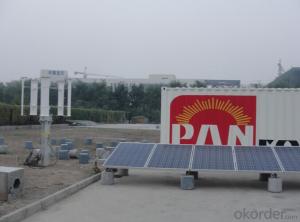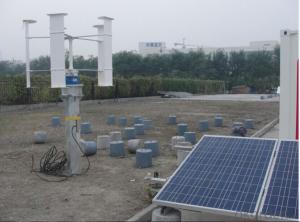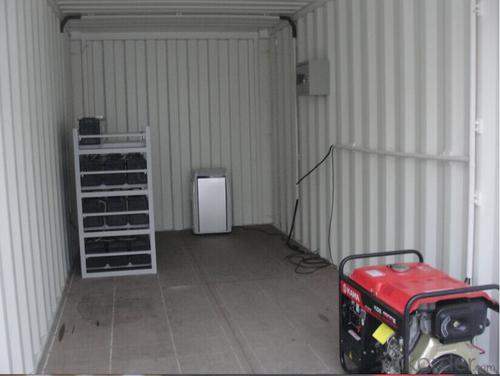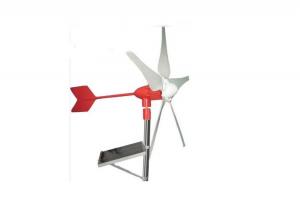Buy Solar Energy Systems - Wind-PV(Diesel) Hybrid Power System
- Loading Port:
- Tianjin
- Payment Terms:
- TT OR LC
- Min Order Qty:
- 2 set
- Supply Capability:
- 30 set/month
OKorder Service Pledge
OKorder Financial Service
You Might Also Like
Specification List
Name | Specification | Quantity | |
1 | Containter | 20*8*8.6ft | 1 |
2 | Solar Module | 240W | 30 |
3 | Wind Generator | 500W | 2 |
4 | Battery | 12V120Ah | 20 |
5 | Controller | 120V/40A | 1 |
6 | Inverter | 6000W/AC230V | 1 |
7 | Diesel | 5000W/AC230V | 1 |
8 | Air Conditioner | 1000W | 1 |
9 | Cables | — | — |
10 | Others | — | — |
2.System Principle
3.System Advantage
Extend battery life |
Reduce the dependence of climate system |
24 hour uninterrupted power supply |
Low maintenance cost |
4.Product Specification
(A) Solar Module
Rated Power | 240W |
Vmppt | 29.4V |
Imppt | 8.17A |
Voc | 37.4V |
Isc | 8.55A |
Power Temp.Coeff(/℃) | -0.47% |
Ambient Temp | -40-85℃ |
Power Tolerance | ±3% |
NOCT | 46℃±2 |
(B) Battery
Rated Voltage | 240V | |
Rated Capacity (C10) | 120Ah | |
Weight | 35kg | |
Dimension | Lenth | 406mm |
Width | 174mm | |
Height | 209mm | |
Capacity | C120 | 150Ah |
C30 | 138Ah | |
C10 | 120Ah | |
C1 | 78Ah | |
Overcharging Protect Voltage | 14.4V/12V | |
Cut off Voltage | 10.8V/12V | |
(C) Wind Generator
Rated Power | 500W |
Rated Wind Speed | 13m/s |
Cut-in Speed | 4m/s |
Cut-out Speed | 25m/s |
Survival Wind Speed | 45m/s |
Mill Diameter | 1.36m |
Mill Height | 1.05m |
Mill Weight | 90kg |
Rated Voltage | AC 42V |
Rated Current | AC 6.9A |
Protection Level | IP54 |
(D) Controller
Solar Controller
Rated Power | 7.2KW |
MPPT | DC120V-350V |
Rated Voltage | DC 120V |
Rated Current | 60A |
Conversion Efficiency | ≥93% |
Overload Capacity | 120% output, 30mins |
Wind Generator Controller
Rated Power | 500W |
Maximum Power | 750W |
Rated Voltage | AC 42V |
E) Inverter
Rated Power | 6000W |
Rated Input Voltage | DC 120V |
Rated Input Current | DC 50A |
Rated Output Voltage | AC 230V |
Rated Frequency | 50Hz |
Rated Current | AC 26.1A |
Output Voltage Precision(V) | 230±5% |
Output Frequency Precision(Hz) | 50±0.05 |
Overload Capacity | 120%, 60S; 150%, 10S |
Inverter Efficiency | 80% |
- Q: How does the quality of solar panels vary across different manufacturers?
- The quality of solar panels can vary significantly across different manufacturers due to variations in materials, manufacturing processes, and quality control measures. Some manufacturers may use higher-quality materials and advanced technologies, resulting in more efficient and reliable solar panels. Additionally, reputable manufacturers often invest in rigorous testing and certification procedures to ensure the durability and performance of their products. On the other hand, lower-quality manufacturers may cut corners in production, leading to less efficient panels with shorter lifespans. Therefore, it is crucial to research and choose solar panels from reputable manufacturers with a proven track record of delivering high-quality and reliable products.
- Q: Are there any risks of electrical arcing with solar energy systems?
- Yes, there are risks of electrical arcing with solar energy systems. Electrical arcing can occur due to various factors such as faulty wiring, loose connections, or damaged components. This can lead to fires, damage to the system, and potential harm to individuals nearby. Therefore, proper installation, regular maintenance, and adherence to safety guidelines are crucial to minimize the risks of electrical arcing in solar energy systems.
- Q: Do solar energy systems require specialized insurance?
- Specialized insurance is typically required for solar energy systems due to their nature as a significant investment and their susceptibility to various risks, including damage from natural disasters, theft, or system malfunctions. Standard homeowner's insurance policies may not offer sufficient coverage for these risks, making it prudent to obtain specialized insurance for solar energy systems. This insurance can cover expenses for repairs or replacements in case of damage or loss and also provide liability coverage for accidents or injuries related to the system. It is crucial to seek advice from insurance providers specializing in renewable energy systems to ensure that the unique requirements and risks associated with solar energy systems are adequately addressed.
- Q: Can solar energy systems work during cloudy or rainy days?
- Yes, solar energy systems can still work during cloudy or rainy days, although their efficiency may be reduced. While direct sunlight is optimal for generating electricity from solar panels, they can still generate power from diffused or scattered sunlight that passes through the clouds. However, the amount of electricity generated will be less compared to sunny days. Some advanced solar technologies are designed to maximize power production even in low light conditions, ensuring a certain level of energy generation even on cloudy or rainy days.
- Q: What is the role of solar trackers in solar energy systems?
- The role of solar trackers in solar energy systems is to optimize the efficiency and output of solar panels by tracking the movement of the sun throughout the day. Solar trackers automatically adjust the position of the panels to ensure that they are always facing the sun at the optimal angle, maximizing the absorption of sunlight and increasing the overall energy generation of the system.
- Q: Can solar panels be installed on different surfaces like glass or metal?
- Yes, solar panels can be installed on different surfaces like glass or metal. In fact, solar panels are commonly installed on rooftops, which are often made of materials like glass, metal, or asphalt shingles. The most common type of solar panels, known as photovoltaic (PV) panels, are designed to be mounted on a variety of surfaces. The installation process involves securing the panels to the surface using racks or frames, ensuring that they are properly angled to maximize sunlight exposure. Whether it is a glass or metal surface, solar panels can be installed and effectively generate electricity from the sun's energy.
- Q: Can solar energy systems be used in rural areas?
- Yes, solar energy systems can definitely be used in rural areas. In fact, solar power is particularly well-suited for rural areas due to its decentralization and independence from the electrical grid. Rural areas often lack access to reliable and affordable electricity, making solar energy an attractive option. Solar panels can be installed on rooftops or on open land, providing a sustainable and renewable source of energy. Additionally, solar energy systems can be combined with energy storage solutions, such as batteries, to ensure a continuous power supply even during periods of low sunlight. This can be particularly beneficial for rural areas that may experience frequent power outages or have limited access to the electrical grid. Moreover, solar energy systems have a low maintenance requirement, making them suitable for remote locations where regular maintenance services may not be readily available. Overall, solar energy is a viable and increasingly popular solution for powering rural areas, offering numerous benefits such as reduced dependence on fossil fuels, cost savings, and environmental sustainability.
- Q: How do solar energy systems impact the efficiency of air conditioning systems?
- Solar energy systems can greatly impact the efficiency of air conditioning systems by providing a clean and renewable source of power. By harnessing the sun's energy, solar systems can reduce the reliance on traditional electricity grids, resulting in lower energy costs and reduced carbon emissions. This allows air conditioning systems to operate more efficiently, as they can draw power from a sustainable source, ultimately leading to energy savings and improved performance.
- Q: How does solar energy storage work?
- Solar energy storage works by capturing and storing the energy produced by solar panels during periods of sunlight. This stored energy can then be used during times when sunlight is not available, such as during the night or on cloudy days. Typically, solar energy storage systems use batteries to store the excess energy generated by the solar panels. These batteries store the energy in the form of chemical potential, which can be converted back into electricity when needed. This allows for a continuous and reliable supply of solar energy, even when the sun is not shining.
- Q: Do solar energy systems require a backup battery system?
- Solar energy systems do not necessarily require a backup battery system, but it can be beneficial to have one depending on your specific needs and circumstances. Solar energy systems generate electricity from the sun and can be connected to the grid, allowing excess energy to be sold back to the utility company. This means that during times when the sun is not shining, such as at night or during cloudy weather, you can still draw electricity from the grid. However, having a backup battery system can provide several advantages. First, it allows you to store excess energy generated during the day for use at night or during power outages. This can provide you with a reliable source of electricity even when the grid is down. Additionally, a backup battery system can provide a more consistent power supply. When connected to the grid, solar energy systems typically shut down during power outages to ensure the safety of utility workers. With a backup battery system, you can continue to power your essential appliances and devices during these outages. Furthermore, having a backup battery system can provide energy independence. By storing your own energy, you can reduce reliance on the grid and potentially offset the cost of electricity bills even further. Ultimately, the decision to install a backup battery system for a solar energy system depends on your specific energy needs, budget, and preferences. Consulting with a solar energy professional can help you determine the best solution for your situation.
Send your message to us
Buy Solar Energy Systems - Wind-PV(Diesel) Hybrid Power System
- Loading Port:
- Tianjin
- Payment Terms:
- TT OR LC
- Min Order Qty:
- 2 set
- Supply Capability:
- 30 set/month
OKorder Service Pledge
OKorder Financial Service
Similar products
Hot products
Hot Searches
Related keywords






















